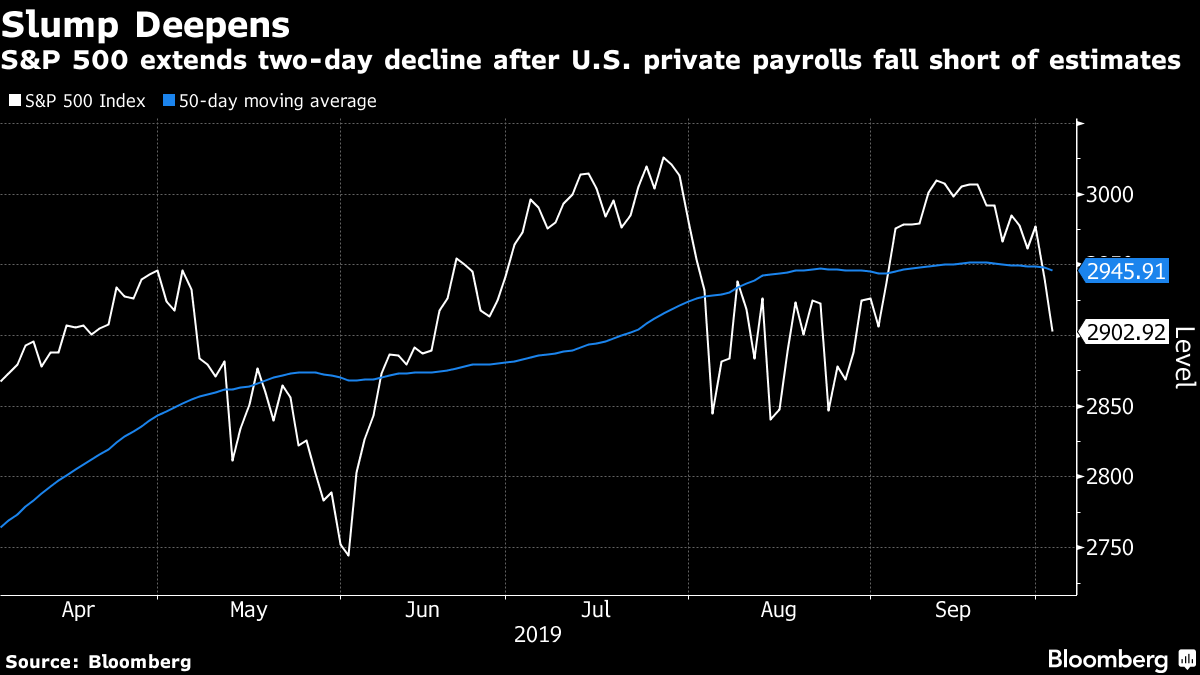Oct 2, 2019
U.S. stocks sink, bonds rise as economic growth fears mount
, Bloomberg News
BNN Bloomberg's closing bell update: Oct. 2, 2019
U.S. stocks tumbled to the lowest since August as another disappointing report fueled fears that the American economy is slowing. Treasuries climbed with gold and the yen on demand for haven assets.
The S&P 500 suffered its first back-to-back drops of more than 1 per cent this year, pushing its two-day slump to the most in two months, as private payrolls fell short of estimates a day after a manufacturing gauge slumped to the lowest in a decade. The index plunged below 2,900 and took out its average price for the past 100 days, levels it hadn’t breached in a month.
Carmakers sank after quarterly sales reports from Ford and General Motors added to concern over thinning profit margins in the industry. All S&P 500 sectors but one sank more than 1 per cent, with industries most sensitive to economic growth dropping the most. Tech and industrials plunged 2 per cent. The Dow Jones Industrial Average tumbled nearly 500 points.
The hiring numbers pushed the 10-year Treasury yield lower for a fifth straight day as it pushed below 1.6 per cent. The yen rose versus the dollar and gold spiked above US$1,500. The equity rout spread to Europe, where the Stoxx 600 saw its biggest slide in 10 months and the FTSE 100 dropped the most since 2016. Oil fell below US$53 a barrel after a report showed U.S. crude inventories increased.

The disappointing data out of the U.S. and Europe, as well as weak earnings reports from automakers this week, is forcing investors to reconsider their strategies. The most recent economic numbers are driving concerns that a slowdown, which had been mostly confined to manufacturing, may be spreading to the consumer as the U.S.-China trade war drags on. Those fears increased bets that the Federal Reserve will cut rates this month. Focus now turns to services PMI data on Thursday and the nonfarm payrolls data on Friday.
“In addition to ISM yesterday, you had auto sales data. You had Honda, Toyota, Nissan with double-digit declines. Much worse than expected,” Willie Delwiche, investment strategist at Baird, said by phone. “It raises enough questions about how resilient is the consumer at this point. We haven’t seen enough to say ‘Yeah, the consumer is folding,’ but questions are starting to intensify.”
Here are some key events coming up this week:
The monthly jobs report is due on Friday.
Federal Reserve Chairman Jerome Powell is set to speak Friday.
The Reserve Bank of India sets policy on Friday.
Here are the main moves in markets:
Stocks
The S&P 500 Index fell 1.8 per cent as of 4 p.m. New York time.
The Nasdaq Composite Index dropped 1.6 per cent, while the Dow Jones Industrial Average slid 1.9 per cent.
The Stoxx Europe 600 Index sank 2.7 per cent.
The U.K.’s FTSE 100 Index sank 3.2 per cent.
The MSCI Asia Pacific Index dipped 0.4 per cent.
Currencies
The Bloomberg Dollar Spot Index fell 0.1 per cent.
The euro advanced 0.2 per cent to US$1.0959.
The Japanese yen gained 0.5 per cent to 107.19 per dollar.
Bonds
The yield on 10-year Treasuries decreased four basis points to 1.59 per cent.
Britain’s 10-year yield climbed three basis points to 0.500 per cent.
Japan’s 10-year yield dipped two basis points to -0.164 per cent.
Commodities
West Texas Intermediate crude lost 2 per cent to US$52.56 a barrel.
Gold increased 1.1 per cent to US$1,505.60 an ounce.









